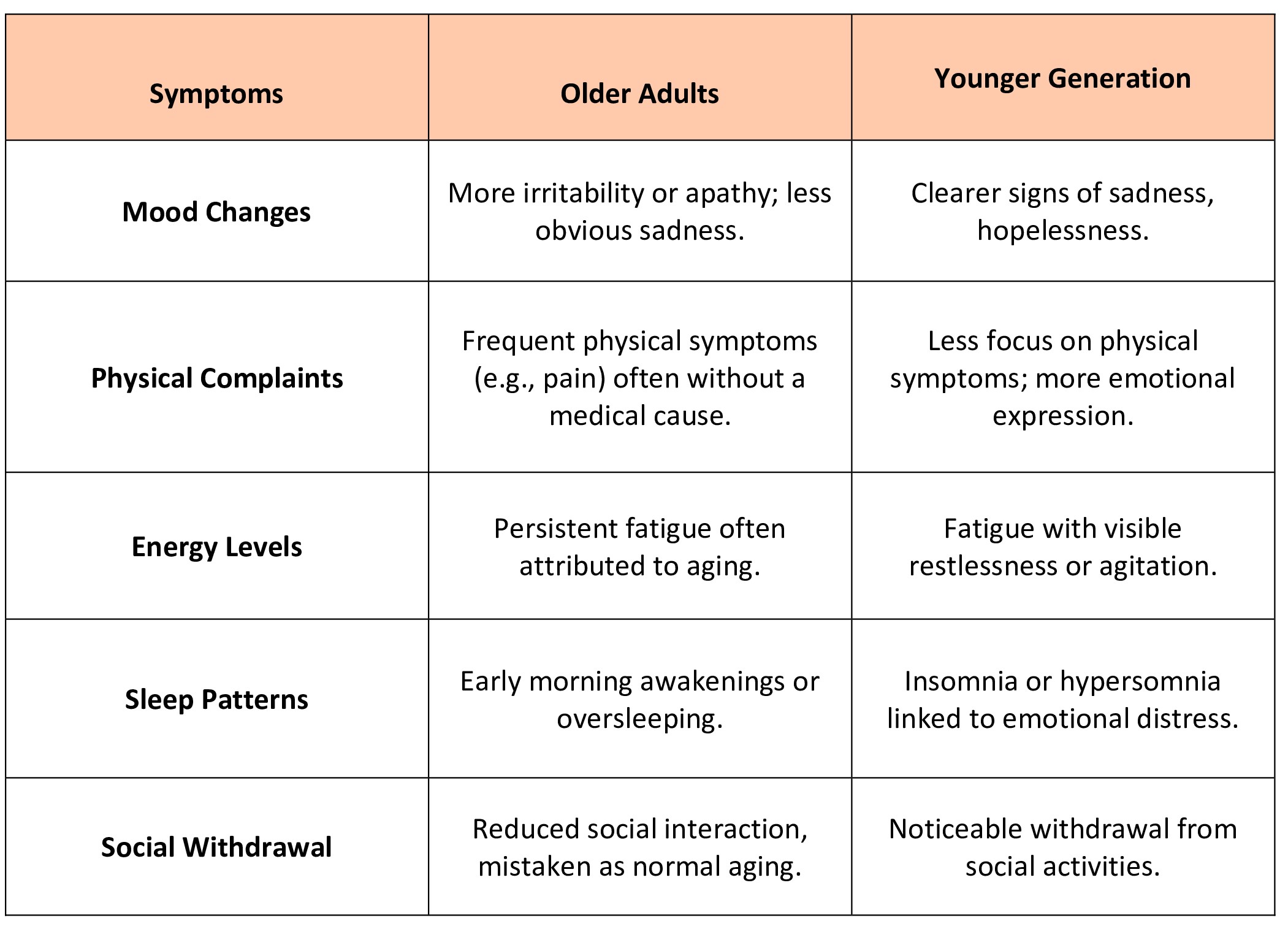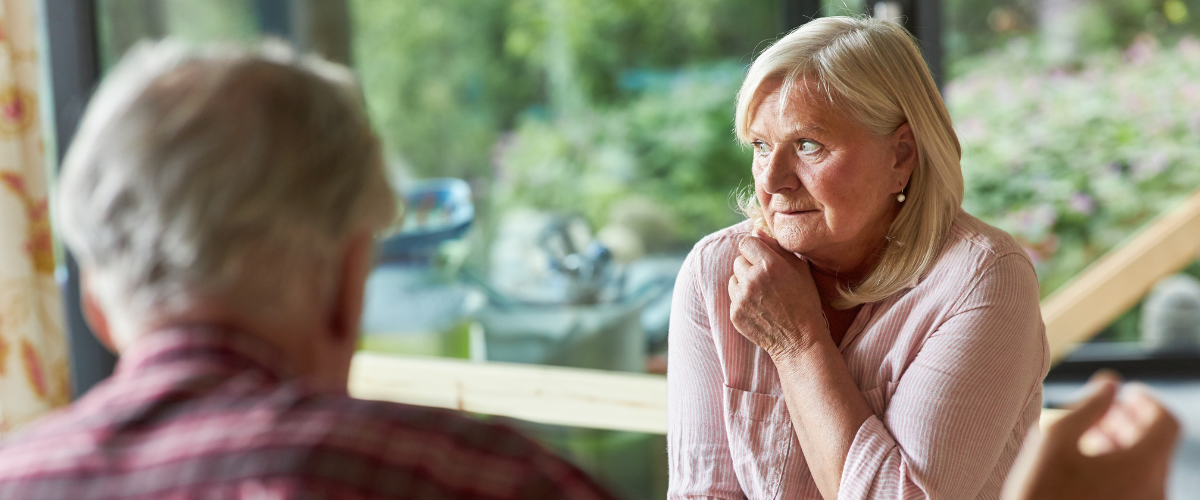This is particularly true for older adults, where depression, often referred to as “geriatric depression,” can manifest in different ways. Recognizing these differences is key to timely diagnosis and effective treatment of geriatric depression. By reading on, you can educate yourself on various techniques and methods to support treatment at home, helping your loved ones manage their symptoms more comfortably.
Table of Contents
ToggleRecognizing Depression in Elders:
To effectively treat depression, identifying its symptoms is a crucial first step. However, it’s important to understand that depression can manifest differently in older adults compared to younger individuals. Here’s a concise overview of the key differences:

Recognizing depression in older adults becomes difficult because these symptoms are commonly mistaken with age-related changes but showing these signs for a content long period is not a good sign.
Treatment Approaches Used by Geriatricians:
When it comes to treating depression in older adults, geriatricians often use a range of approaches to address both the mental and physical aspects of the condition. Here’s a closer look at some of these strategies:
1. Psychotherapy:
- Reminiscence Therapy (RT): Ever notice how talking about old memories can make you feel lighter? That’s the idea behind reminiscence therapy. Geriatricians encourage seniors to reflect on past experiences using prompts like photos. This not only improves mood but can be even more effective when combined with medication. Studies show that RT can significantly reduce symptoms of depression in older adults.
- Cognitive Behavioral Therapy (CBT): CBT helps identify and change negative thought patterns, which is especially helpful for older adults dealing with loss, health challenges, or loneliness. It equips them with practical strategies to manage their emotions.
- Group Therapy: Social support is essential and group therapy provides that social support, and space for older adults to connect with others. Research suggests that group therapy can be a powerful way to reduce depressive symptoms. There’s something comforting about sitting in a room with others who are going through similar struggles. It reminds you that you’re not alone; others truly understand what you’re feeling. This sense of community can make a huge difference in managing depression.
2. Medication Management:
Geriatricians may prescribe antidepressants, but they do so with caution. Older adults often have other health conditions and take multiple medications, so starting at a lower dose and gradually adjusting it helps minimize side effects.
3. Lifestyle Changes:
-
Staying active is so important, not just for physical health but also for your mood and mental well-being. It doesn’t have to be complicated, either! You could try some lightweight training to keep your muscles strong and joints steady, or mix things up with activities like swimming, walking, yoga, or even dancing.
- Life becomes dull as you age, always struggling to do something so why not engage your mind with activities that challenge you, like puzzles, crosswords, or reading. Try picking new hobbies that spark curiosity, keeping your mental skills sharp and focused.
- Gardening is a great way to stay active and spend time outdoors. If you don’t have a yard, explore options like community gardens or a small patio setup with potted plants.
- Pets can bring a lot of joy and companionship into your life. Whether it’s a dog, cat, or even a bird, animals can lift your spirits and help you feel less alone. Dogs, in particular, offer the bonus of daily walks, which means more exercise and social interaction. I have noticed people tend to talk to you when you are walking your pet or going on a walk with a baby as it gives them the starter for conversation.
- Creativity knows no age limit and if you are only dealing with depression alone don’t hesitate to try out new things. Drawing, painting, knitting, cooking, or photography are fantastic ways to express yourself. Joining art classes or craft groups can also introduce you to like-minded people, adding a social element to your creativity.
4. Working with Mental Health Professionals:
Geriatricians collaborate with psychologists, psychiatrists, social workers, and other mental health professionals to create a comprehensive care plan. This team approach makes sure all aspects of the patient’s mental health are covered.
5. Managing Physical Health:
Physical health is closely tied to mental well-being. Geriatricians address chronic conditions, manage pain, and encourage healthy lifestyle habits like proper nutrition and sleep. Regular check-ups help catch and manage any physical issues contributing to depression.
Read More: 7 Nutrition Tips for Seniors
Get To Know Us:
We are here to support seniors with dedication and compassionate care, helping you lead a healthier, happier life in the comfort of your own home. Contact us, and we will help match you with the right care plan.
The Takeaway:
Depression, often called an invisible disease, can be hard to recognize, especially in older adults. However, once it’s identified, healthcare professionals use multiple steps and approaches to manage it effectively. If you start noticing signs of depression, such as changes in mood, appetite, or energy levels in your loved ones, it’s important to consult with a healthcare provider to discuss the next steps. Early intervention can make a significant difference.
FAQ’s
1. How can depression in elderly patients be detected early?
Look for noticeable changes in mood, energy levels, sleep patterns, or appetite. Older adults might not express typical depressive symptoms, so a comprehensive evaluation by a healthcare professional is vital.
2. Can physical activity help alleviate depression in older adults?
Yes, regular physical activity has been shown to improve emotional well-being and reduce symptoms of depression in elderly patients.
3. What is the most common cause of depression in older adults?
Chronic health conditions, social isolation, loss of loved ones, and significant life changes like retirement are the most common causes of depression in older adults.
4. What are the four common mental illnesses in the elderly?
The four common mental illnesses are depression, anxiety disorders, dementia, and delirium.
5. What are the consequences of depression in the elderly?
Depression in older adults can lead to physical health decline, increased disability, social isolation, a higher risk of suicide, and cognitive impairment.

Fakiha is an experienced writer at ConsidraCare with an optimistic interest in life. She has a proactive approach to improving health and wellness for seniors. She offers well-researched and thoughtful information to help individuals make informed healthcare decisions for themselves and their loved ones.



